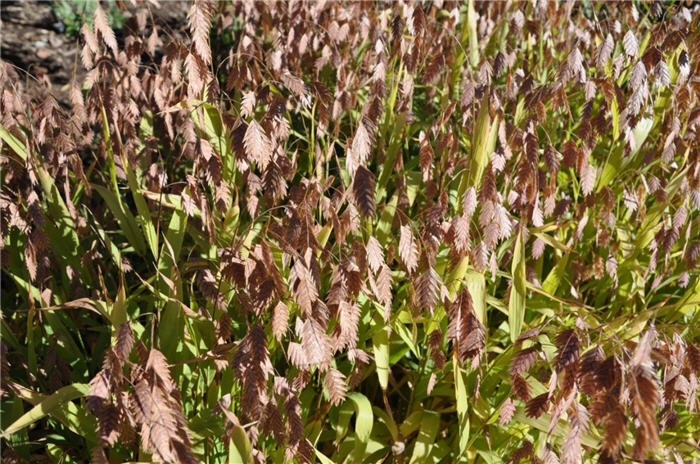| Botanical Name: Chasmanthium latifolium | |
| Common Name: Northern Sea Oats |

-
Anatomy
-
Culture
-
Design
Plant Type
Perennial, Grass
Height Range
1-3'
Flower Color
Gold, Green
Flower Season
Summer, Fall
Leaf Color
Green
Bark Color
n/a
Fruit Color
n/a
Fruit Season
n/a
Sun
Half, Shade
Water
Medium, High
Growth Rate
Moderate
Soil Type
Sandy, Clay, Loam
Soil Condition
Average, Rich, Poor, Well-drained, Moist
Soil pH
Neutral, Basic
Adverse Factors
Invasive
Design Styles
English Cottage, Formal, Meadow, Mediterranean, Ranch, Spanish, Water Garden, Wetlands, Woodland
Accenting Features
Showy Flowers, Silhouette
Seasonal Interest
Winter, Summer, Fall
Location Uses
Entry, Perennial Border, Shrub Border, Foundation
Special Uses
Cut Flowers, Hedge, Mass Planting, Naturalizing
Attracts Wildlife
Birds
Information by: Stephanie Duer
Photographer: Steve Mullany/Dowsett
Photographer: Steve Mullany/Dowsett
-
Description
-
Notes
A beautiful ornamental grass known for it's showy, drooping seed heads and it's lush green foliage. Grass greens up mid spring, turns a lovely copper color in fall, eventually changing to brown during the winter. The seed heads look like flattened rattle snake rattles, and emerge green, turning to tawny brown in the summer. Very persistent into the winter months. Place in the garden where it will be back lit by the late day sun, where it will illuminate the seed heads. A lovely summer through winter silhouette. Grows 2 to 3 feet tall and wide.
Grow in full sun to filtered light. In our hot, dry summers, Northern sea oats appreciates a bit of extra water. Alternatively, grown in part shade and it will require less water. Grows in any soil , except the most sandy. Cut back in late winter (see Guides). It may self-seed; a benefit or annoyance, depending on your approach to gardening.